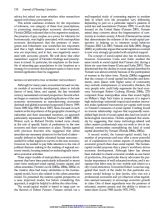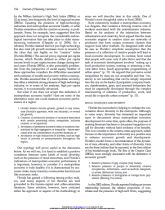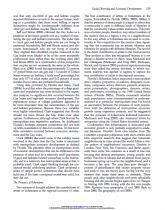Hledej
Zobraz:
Univerzity
Kategorie
Rozšířené vyhledávání
12 662
projektů
Social Diversity and Economic Development in the Metropolis
| Přípona |
Typ projekt |
Stažené 0 x |
| Velikost 0,1 MB |
Jazyk anglický |
ID projektu 2948 |
| Poslední úprava 27.03.2014 |
Zobrazeno 945 x |
Autor: eliseus |
 Sdílej na Facebooku
Sdílej na Facebooku |
||
| Detaily projektu | ||
- Cena:
2 Kreditů - kvalita:
87,0% -
Stáhni
- Přidej na srovnání
- Univerzita:Univerzita Tomáše Bati ve Zlíně
- Fakulta:Fakulta managementu a ekonomiky
- Kategorie:Ekonomika » Management
- Předmět:Management
- Studijní obor:-
- Ročník:-
- Formát:PDF dokument (.pdf)
- Rozsah A4:17 stran
Regional economic-development theorists have
become increasingly focused on understanding what
makes metropolitan economies grow. Richard Florida,
the prime proponent of the “creative capital” perspective,
argued that metropolitan economic development
is extremely dependent on the presence of four main
conditions: technology, talent, tolerance, and good
quality of place. Particularly noteworthy in Florida’s
discussion is the third element of this list, tolerance of
diversity, which he defined as including tolerance for
different sexual orientations, races, foreign-born backgrounds,
and bohemian occupations. He presented
tolerance as a key prerequisite for economic growth in
the new, technologically based metropolitan economy.
This article presents some of the findings of a study
carried out for the state of Michigan in 2004-2005. This
state, like others throughout the country, has sought to
adopt an economic development theory that was
grounded in empirical evidence and that could suggest
necessary policy directions.
become increasingly focused on understanding what
makes metropolitan economies grow. Richard Florida,
the prime proponent of the “creative capital” perspective,
argued that metropolitan economic development
is extremely dependent on the presence of four main
conditions: technology, talent, tolerance, and good
quality of place. Particularly noteworthy in Florida’s
discussion is the third element of this list, tolerance of
diversity, which he defined as including tolerance for
different sexual orientations, races, foreign-born backgrounds,
and bohemian occupations. He presented
tolerance as a key prerequisite for economic growth in
the new, technologically based metropolitan economy.
This article presents some of the findings of a study
carried out for the state of Michigan in 2004-2005. This
state, like others throughout the country, has sought to
adopt an economic development theory that was
grounded in empirical evidence and that could suggest
necessary policy directions.
Klíčová slova:
economic development
race
creative cities
diversity
metropolitan areas
Obsah:
- Social tolerance and diversity
The presence of gays and lesbians
Racial diversity
Conclusion
References
Zdroje:
- Aldrich, Robert. 2004. Homosexuality and the city: An historical overview. Urban Studies 41 (9): 1719-37.
- Alphabet soup geography of cool. 2000. The Economist 355 (8166): 92. Altshuler, Alan. 1999.
- Governance and opportunity in metropolitan areas. Washington, DC: National Academy Press.Back to front. 2000. The Economist 355 (8166): 92.
- Baum, Howell S. 2004. Smart growth and school reform: What if we talked about race and took community seriously. Journal of the American Planning Association 70 (1): 14-26.
- Bell, David, and Jon Binnie. 2004. Authenticating queer space: Citizenship, urbanism and governance. Urban Studies 41 (9): 1807-20.
- Binnie, Jon. 2004. Quartering sexualities: Gay villages and sexual citizenship.
- In City of quarters: Urban villages in the contemporary city, edited by David Bell and Mark Jayne, 162-72. Burlington, VT: Ashgate.
- Binnie, Jon, and Beverley Skeggs. 2004. Cosmopolitan knowledge and the production and consumption of sexualized space: Manchester’s gay village. Sociological Review 52 (1): 39-61.
- Black, Dan, Gary Gates, Seth Sanders, and Lowell Taylor. 2000. Demographics of the gay and lesbian population in the United States: Evidence from available systematic data sources. Demography 37 (2): 139-54.
- Boal, Frederick. 2005. Urban ethnic segregation and the scenarios spectrum. In Desegregating the city: Ghettos, enclaves and inequality, edited by D. P. Varady, 62-78. Albany, NY: State University of New York Press.
- Borjas, George J. 1994. The economics of immigration. The Journal of Economic Literature 32:1667-717. ———. 1995. The economic benefits from immigration. Journal of Economic Perspectives 9:3-22.
- Briggs, Xavier de Souza. 2005. Social capital and segregation in the United States. In Desegregating the city: Ghettos, enclaves, and inequality, edited by D. P. Varady, 79-107. Albany, NY: State University of New York Press.
- Brookings Institution. 2001. Racial change in the nation’s largest cities: Evidence from the 2000 census. Washintgon, DC: Brookings Institution Center on Urban and Metropolitan Policy.
- Bugler, Daniel T., Gary T. Henry, and Ross Rubenstein. 1999. An evaluation of Georgia’s Hope Scholarship program: Effects of Hope on grade inflation, academic performance, and college enrollment. Report for the Council for School Performance, Andrew Young School of Policy Studies, Georgia State University.



